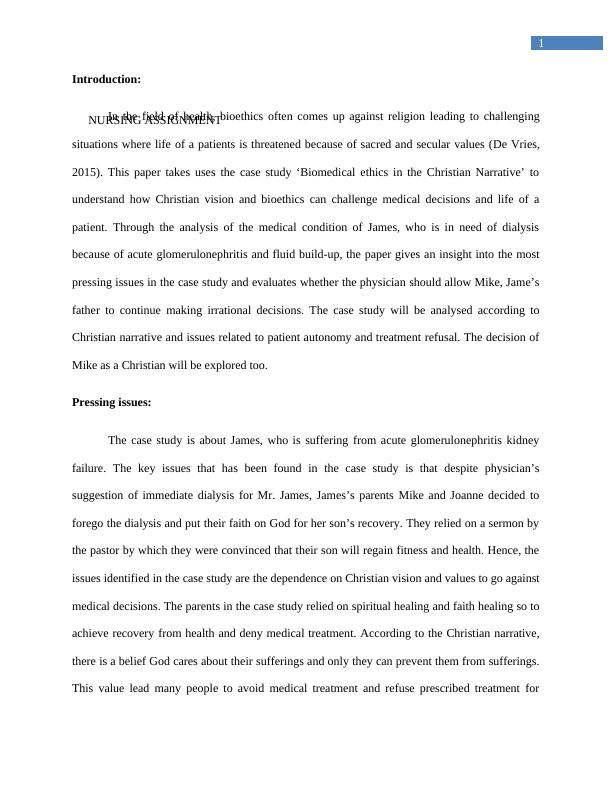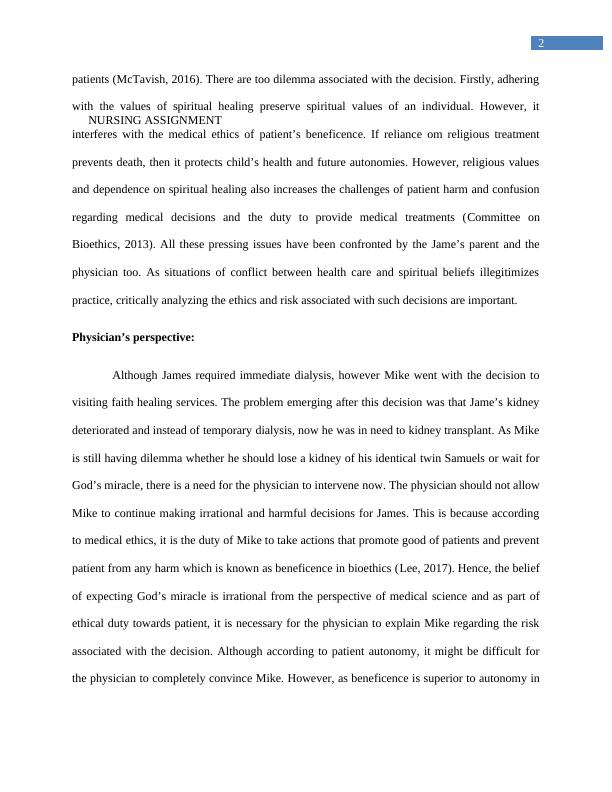Christian Bioethics and Treatment Refusal: A Case Study Analysis
Added on 2022-11-28
7 Pages1639 Words143 Views
Running head: NURSING ASSIGNMENT
NURSING ASSIGNMENT
Name of the Student
Name of the university
Author’s note
NURSING ASSIGNMENT
Name of the Student
Name of the university
Author’s note

1
NURSING ASSIGNMENT
Introduction:
In the field of health, bioethics often comes up against religion leading to challenging
situations where life of a patients is threatened because of sacred and secular values (De Vries,
2015). This paper takes uses the case study ‘Biomedical ethics in the Christian Narrative’ to
understand how Christian vision and bioethics can challenge medical decisions and life of a
patient. Through the analysis of the medical condition of James, who is in need of dialysis
because of acute glomerulonephritis and fluid build-up, the paper gives an insight into the most
pressing issues in the case study and evaluates whether the physician should allow Mike, Jame’s
father to continue making irrational decisions. The case study will be analysed according to
Christian narrative and issues related to patient autonomy and treatment refusal. The decision of
Mike as a Christian will be explored too.
Pressing issues:
The case study is about James, who is suffering from acute glomerulonephritis kidney
failure. The key issues that has been found in the case study is that despite physician’s
suggestion of immediate dialysis for Mr. James, James’s parents Mike and Joanne decided to
forego the dialysis and put their faith on God for her son’s recovery. They relied on a sermon by
the pastor by which they were convinced that their son will regain fitness and health. Hence, the
issues identified in the case study are the dependence on Christian vision and values to go against
medical decisions. The parents in the case study relied on spiritual healing and faith healing so to
achieve recovery from health and deny medical treatment. According to the Christian narrative,
there is a belief God cares about their sufferings and only they can prevent them from sufferings.
This value lead many people to avoid medical treatment and refuse prescribed treatment for
NURSING ASSIGNMENT
Introduction:
In the field of health, bioethics often comes up against religion leading to challenging
situations where life of a patients is threatened because of sacred and secular values (De Vries,
2015). This paper takes uses the case study ‘Biomedical ethics in the Christian Narrative’ to
understand how Christian vision and bioethics can challenge medical decisions and life of a
patient. Through the analysis of the medical condition of James, who is in need of dialysis
because of acute glomerulonephritis and fluid build-up, the paper gives an insight into the most
pressing issues in the case study and evaluates whether the physician should allow Mike, Jame’s
father to continue making irrational decisions. The case study will be analysed according to
Christian narrative and issues related to patient autonomy and treatment refusal. The decision of
Mike as a Christian will be explored too.
Pressing issues:
The case study is about James, who is suffering from acute glomerulonephritis kidney
failure. The key issues that has been found in the case study is that despite physician’s
suggestion of immediate dialysis for Mr. James, James’s parents Mike and Joanne decided to
forego the dialysis and put their faith on God for her son’s recovery. They relied on a sermon by
the pastor by which they were convinced that their son will regain fitness and health. Hence, the
issues identified in the case study are the dependence on Christian vision and values to go against
medical decisions. The parents in the case study relied on spiritual healing and faith healing so to
achieve recovery from health and deny medical treatment. According to the Christian narrative,
there is a belief God cares about their sufferings and only they can prevent them from sufferings.
This value lead many people to avoid medical treatment and refuse prescribed treatment for

2
NURSING ASSIGNMENT
patients (McTavish, 2016). There are too dilemma associated with the decision. Firstly, adhering
with the values of spiritual healing preserve spiritual values of an individual. However, it
interferes with the medical ethics of patient’s beneficence. If reliance om religious treatment
prevents death, then it protects child’s health and future autonomies. However, religious values
and dependence on spiritual healing also increases the challenges of patient harm and confusion
regarding medical decisions and the duty to provide medical treatments (Committee on
Bioethics, 2013). All these pressing issues have been confronted by the Jame’s parent and the
physician too. As situations of conflict between health care and spiritual beliefs illegitimizes
practice, critically analyzing the ethics and risk associated with such decisions are important.
Physician’s perspective:
Although James required immediate dialysis, however Mike went with the decision to
visiting faith healing services. The problem emerging after this decision was that Jame’s kidney
deteriorated and instead of temporary dialysis, now he was in need to kidney transplant. As Mike
is still having dilemma whether he should lose a kidney of his identical twin Samuels or wait for
God’s miracle, there is a need for the physician to intervene now. The physician should not allow
Mike to continue making irrational and harmful decisions for James. This is because according
to medical ethics, it is the duty of Mike to take actions that promote good of patients and prevent
patient from any harm which is known as beneficence in bioethics (Lee, 2017). Hence, the belief
of expecting God’s miracle is irrational from the perspective of medical science and as part of
ethical duty towards patient, it is necessary for the physician to explain Mike regarding the risk
associated with the decision. Although according to patient autonomy, it might be difficult for
the physician to completely convince Mike. However, as beneficence is superior to autonomy in
NURSING ASSIGNMENT
patients (McTavish, 2016). There are too dilemma associated with the decision. Firstly, adhering
with the values of spiritual healing preserve spiritual values of an individual. However, it
interferes with the medical ethics of patient’s beneficence. If reliance om religious treatment
prevents death, then it protects child’s health and future autonomies. However, religious values
and dependence on spiritual healing also increases the challenges of patient harm and confusion
regarding medical decisions and the duty to provide medical treatments (Committee on
Bioethics, 2013). All these pressing issues have been confronted by the Jame’s parent and the
physician too. As situations of conflict between health care and spiritual beliefs illegitimizes
practice, critically analyzing the ethics and risk associated with such decisions are important.
Physician’s perspective:
Although James required immediate dialysis, however Mike went with the decision to
visiting faith healing services. The problem emerging after this decision was that Jame’s kidney
deteriorated and instead of temporary dialysis, now he was in need to kidney transplant. As Mike
is still having dilemma whether he should lose a kidney of his identical twin Samuels or wait for
God’s miracle, there is a need for the physician to intervene now. The physician should not allow
Mike to continue making irrational and harmful decisions for James. This is because according
to medical ethics, it is the duty of Mike to take actions that promote good of patients and prevent
patient from any harm which is known as beneficence in bioethics (Lee, 2017). Hence, the belief
of expecting God’s miracle is irrational from the perspective of medical science and as part of
ethical duty towards patient, it is necessary for the physician to explain Mike regarding the risk
associated with the decision. Although according to patient autonomy, it might be difficult for
the physician to completely convince Mike. However, as beneficence is superior to autonomy in

End of preview
Want to access all the pages? Upload your documents or become a member.
Related Documents
Healing and Autonomy: Christian Ethics and Ethical Decision Makinglg...
|8
|1902
|274
Healing and Autonomy | Case Studylg...
|6
|1371
|213
Principles of Bioethics: Case Studylg...
|8
|1627
|30
Case Study: Healing and Autonomylg...
|8
|2163
|413
Health Workers and Christianity.lg...
|6
|1403
|26
Healing and Autonomy Case Study 2022lg...
|6
|1269
|43
